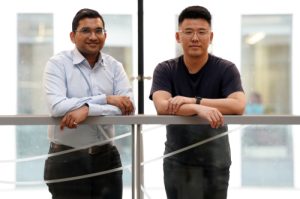
We spoke to Co-Founders, Shashwat Ganguly & Yiqiang Zhao about the company’s next steps and how the AI Accelerator has helped Looper achieve major milestones.

YZ: We started out helping architects calculate the carbon footprint of the buildings they design, thinking we could make software for this process and commercialise it. Gradually, we realised that the true pain point is not how they calculate carbon, but instead the data sources from manufacturers providing different materials. Going deeper, we realised climate data sources and whole-lifecycle product information are a fundamental challenge for all industries. Since that was the root of the problem, we wanted to design software to address it.
YZ: We are a software startup that helps manufacturers generate product climate certifications in one place. Our customers are mainly in the construction and manufacturing sectors, but we also have government bodies as customers, such as South of Scotland Enterprise and Zero Waste Scotland. Recently, we have expanded to the textiles industry, working with New Look to help manage their product-level information.
YZ: Our journey started when we formed a team as part of the Creative Bridge programme from the University of Edinburgh and Creative Informatics. Our idea for Looper received funding for a £12K programme lasting around half a year. The University provided a really good platform for us to explore ideas and learn through their programmes to iterate and start validating our product.
SG: What we are doing at Looper is linked with our studies. We had several discussions about using our research in a practical way, but as students, we knew nothing about the business world. The Student Enterprise team helped us with some of the business basics and encouraged us to explore our ideas and talk to people. We then secured a University Graduate Enterprise Grant which enabled us to hire freelancers to develop the product. After gaining traction with customers, we were then accepted onto the AI Accelerator. The programme has provided the expertise, guidance and support we needed to take us to the next level and make a compelling business case for growing our customer base and securing investment.
YZ: The entrepreneurship support from the University has provided a great pathway to support our journey. It has not only helped fund our progress, but also provided investment connections and different kinds of academic support.
SG: We received lots of advice that we needed to talk to people. At first, we thought if our software looks good, then people will come and use it. But the advice was that we had to understand the market first, so we started reaching out to conduct interviews with potential customers.
YZ: The AI Accelerator is a really good programme. It fixed a lot of challenges we had. For example, when we realised we needed to totally rethink our financial modelling, the programme team found the right people to help. They would check in with all the participating companies and have one-to-one sessions with everyone to gauge requirements and gradually bring in support points. That dynamic support is amazing.
SG: Our major incentive for integrating AI is to improve engagement with manufacturers from different sectors. They each have their own language and workflow, and most might not be tech savvy. We want to design an interface requiring minimal effort from their side so that they quickly get the output they need, which is climate impact and reporting for their product. That's where we are leveraging AI advancements like large language models (LLMs) and generative pre-trained transformers (GPTs). We want to use AI to help with our product vision, rather than just being a “cool thing to add”.
YZ: Definitely. In the early stages, we just wanted to have some paying customers. Now, success is mainly about reaching product-market fit to enable £1M annual recurring revenue. That's our current target.
YZ: The first target for us is integrating responsible AI. Generative AI might give great ideas, but there’s no responsibility or accountability if things go wrong. When we use AI to help customers calculate some of their climate impact, there needs to be a clear responsibility for the verification and validation of the calculation. We're still exploring this area for now.
SG: Another area we want to scale up is our reach into different sectors. We’re looking into semiconductors, space tech, and automobiles. The possibilities are huge, because under the hood, the methodology of our tech is the same across all industries.
Dynamic | Insight | Growth
